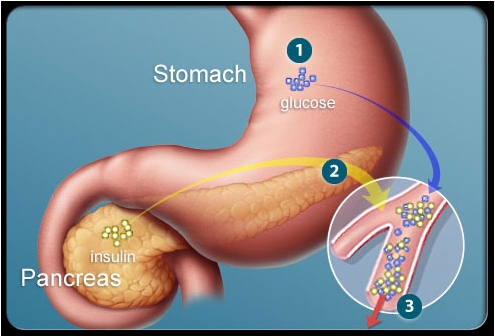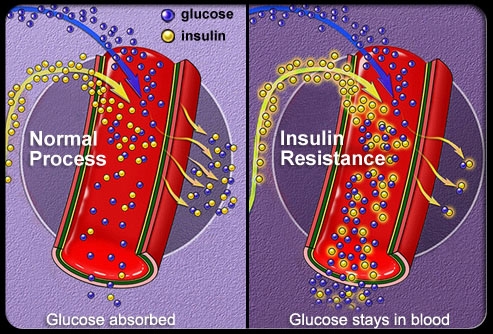What Is Type 2 Diabetes?
Type 2 diabetes strikes people of all ages, and early symptoms are subtle. In fact, about one out of three people with type 2 diabetes don't know they have it. This chronic condition thwarts the body's ability to use the carbohydrates in food for energy. The result is elevated blood sugar. Over time, this excess sugar raises the risk for heart disease, loss of vision, nerve and organ damage, and other serious conditions.
Diabetes Warning Sign: Thirst
People with type 2 diabetes frequently have no symptoms. When symptoms do appear, one of the first may be an increase in thirst. This is often accompanied by additional problems, including dry mouth, increased appetite, frequent urination -- sometimes as often as every hour -- and unusual weight loss or gain.
Diabetes Warning Sign: Headaches
As blood sugar levels become more abnormal, additional symptoms may include headaches, blurred vision, and fatigue.
Diabetes Warning Sign: Infections
In most cases, type 2 diabetes is not discovered until it takes a noticeable toll on health. One red flag is troubling infections, such as:
• Cuts or sores that are slow to heal
• Frequent yeast infections or urinary tract infections
• Itchy skin, especially in the groin area
Diabetes Warning Sign: Sexual Dysfunction
Sexual dysfunction is common among people with diabetes. Diabetes can cause damage to blood vessels and nerve endings in the genitals, leading to a loss of feeling and making orgasm difficult. Other complications can include vaginal dryness and impotence in men. It's estimated between 35% and 70% of men with diabetes will have at least some degree of impotence in their lifetime. And about 1 in 3 women with diabetes will experience some form of sexual dysfunction.
Risk Factors You Can Control
Some health habits and medical conditions related to your lifestyle can increase the odds of developing type 2 diabetes, including:
• Being overweight, especially at the waist
• A sedentary lifestyle
• Smoking
• A diet high in red meat, processed meat, high-fat dairy products, and sweets
• Abnormal cholesterol and blood fats, such as HDL "good" cholesterol lower than 35 mg/dL or a triglyceride level over 250 mg/dL
Risk Factors You Can't Control
Other risk factors are out of your control, including:
• Race or ethnicity: Hispanics, African Americans, Native Americans, and Asians have a higher than average risk.
• Family history of diabetes: Having a parent or sibling with diabetes boosts your risk.
• Age: Being 45 and older increases your risk of type 2 diabetes.
The more risk factors you have, the greater your odds of developing type 2 diabetes.
Risk Factors for Women
Having gestational diabetes when you're pregnant puts you at higher risk for developing type 2 diabetes later on. Women who give birth to a baby weighing over 9 pounds are also at risk. Having a history of polycystic ovary syndrome can also cause insulin resistance that can lead to diabetes.
How Does Insulin Work?
In a healthy person, insulin helps turn food into energy -- in an efficient manner. The stomach breaks down carbohydrates from food into sugars, including glucose. Glucose then enters the bloodstream, which stimulates the pancreas to release insulin in just the right amount. Insulin, a hormone, allows glucose to enter cells throughout the body, where it is used as fuel. Excess glucose is stored in the liver.
Type 2 Diabetes: Metabolism Mishaps
In type 2 diabetes, the cells cannot absorb glucose properly. That means glucose levels in the blood become elevated. If you've developed a condition called insulin resistance, the body makes excess insulin, but the muscle, liver, and fat cells do not use or respond properly to the insulin. With long-standing uncontrolled type 2 diabetes, the pancreas will reduce the amount of insulin it produces.
Diagnosing Type 2 Diabetes
A simple blood test can diagnose diabetes. The A1C test gives a snapshot of your average blood glucose level over the past 2-3 months. An A1C level of 6.5% or higher may indicate diabetes. With a fasting plasma glucose test, a result above 126 is considered diabetes. Your doctor may order an oral glucose challenge test with a two-hour blood test. In people with classic symptoms of diabetes, a random blood glucose level of greater than 200 can help diagnosis diabetes.
Managing Diabetes: Diet
Fortunately, controlling blood sugar levels by changing diet can also cut your risk of complications. People with type 2 diabetes should carefully monitor carbohydrate consumption, as well as total fat and protein intake, and reduce calories. Ask your doctor for a referral to a registered dietitian to help you with healthy choices and an eating plan that will work for you.
Managing Diabetes: Exercise
Routine exercise, such as strength training or walking, improves the body's use of insulin and can lower blood sugar levels in people with type 2 diabetes. Being active also helps reduce body fat, lower blood pressure, and protect against heart disease. People with type 2 diabetes should try to get 30 minutes of moderate exercise on most days of the week.
Managing Diabetes: Stress Reduction
Stress can cause blood pressure to rise. It can also increase glucose levels in your blood as part of your "fight or flight" response. Or you may turn to food to cope with stress. All are bad when living with diabetes. Instead of letting stress take its toll, try practicing relaxation techniques such as deep breathing, meditation, or visualization. Sometimes talking to a friend, family member, counselor, or member of the clergy can help. If you're still battling stress, reach out to your doctor.
Managing Diabetes: Oral Medication
When people with type 2 diabetes are unable to control blood sugar sufficiently with diet and exercise, medication may be added. There are many types of diabetes pills available, and they are often used in combination. Some work by stimulating the pancreas to make more insulin, and others improve the effectiveness of insulin, or block the digestion of starches.
Managing Diabetes: Insulin
Your doctor may prescribe insulin early on in your treatment and in combination with pills. Insulin is also used in people with type 2 diabetes who develop "beta-cell failure." This means the cells in the pancreas no longer produce insulin in response to high blood sugar levels. In this case, insulin therapy -- injections or an insulin pump -- must become part of the daily routine.
Non-Insulin Injectables
New drugs are available for people with type 2 diabetes. Pramlintide (Symlin), exenatide (Byetta), and liraglutide (Victoza) are non-insulin injectable drugs. Whereas insulin pulls glucose into the cells, these medications cause the body to release insulin to control blood sugar levels.
Glucose Testing
Testing your blood glucose level will let you know how controlled your blood sugars are and if you need to take actions to change your treatment plan. How often and when you test will be based on how controlled your diabetes is, the type of therapy used to control your diabetes, and whether you are experiencing symptoms of fluctuating sugars. Talk with your doctor to find out how often you should use a glucose meter to check your blood sugar. Some common testing times may be when waking up, before and after meals and exercise, and at bedtime.
Continuous glucose monitor (GGM) may be useful to those with type 1 diabetes to help lower their blood glucose.
Long-Term Damage: Arteries
Over time, untreated type 2 diabetes can damage many of the body's systems. About two out of three people with diabetes die of heart disease. Having diabetes also puts you at a two to four times higher risk for stroke. People with diabetes are likely to develop plaque in their arteries, reducing blood flow and increasing risk of clots. This hardening of the arteries (atherosclerosis) raises the risk of heart attack and stroke.
Long-Term Damage: Kidneys
The longer you have diabetes, the greater the risk of developing chronic kidney disease. Diabetes is the leading cause of kidney failure, accounting for 44% of new cases in 2008. Controlling risk factors such as uncontrolled diabetes, high blood pressure, and high cholesterol reduces your risk of developing this complication. Annual screening for kidney disease and medications, which slow the development and progression of kidney disease, are used to reduce your risk of kidney failure.
Long-Term Damage: Eyes
High blood sugar can damage the tiny blood vessels that bring oxygen and nutrients to the retina, a critical part of the eye. This is known as diabetic retinopathy, and it can cause progressive, irreversible vision loss. It is the leading cause of new cases of blindness in people between the ages of 20 and 74. Pools of blood, or hemorrhages, on the retina of an eye are visible in this image.
Long-Term Damage: Nerve Pain
Over time, uncontrolled diabetes and elevated blood sugars create a very real risk for nerve damage. Symptoms can include tingling, numbness, pain, and a pins and needles sensation -- often in the fingers, hands, toes, or feet. The damage is not reversible, but treatments can help with the pain and numbness. And controlling your diabetes can help prevent further damage.
Long-Term Damage: Feet
Diabetic nerve damage can make it difficult to feel your feet and detect injury. At the same time, hardening of the arteries results in poor blood flow to the feet. Foot sores and gangrene can occur, even from small injury. In severe cases, infections can go unchecked and result in an amputation.
Preventing Type 2 Diabetes
One of the most astonishing things about type 2 diabetes is that such a life-altering condition is often preventable. To lower your risk, follow the same guidelines for warding off heart disease:
• Eat a healthy diet.
• Exercise for 30 minutes, five days a week.
• Maintain a healthy weight.
• Talk to your doctor about being screened for prediabetes.
In people with prediabetes, lifestyle changes and medication can help prevent the progression to type 2 diabetes.




